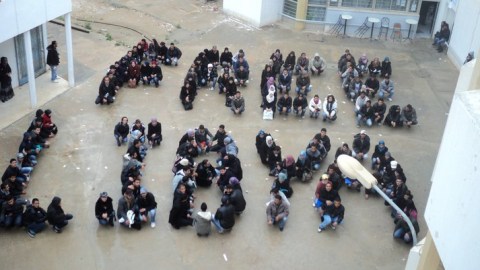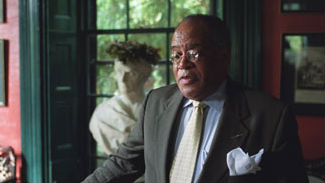Libya: To Intervene, Or Not To Intervene?

To intervene, or not to intervene; that is the question. Or is it? When it comes to the Libyan revolution, and the peculiar madness of Colonel Gadaffi, what is the right thing to do?
Yesterday evening, he was interviewed by ABC and the BBC, to begin with wearing dark shades and then next without them; the piggy eyes of an old man utterly divorced from reality. The theatrics were unmissable and hugely entertaining, although it is difficult to laugh when one realises that literally a few miles away unarmed civilians were being mown down by Gadaffi’s hired thugs. Here was Gadaffi, seeming unflappable, on form and displaying an impish sense of humour. Except that he was apparently being deadly serious as he claimed; “My people love me! All of them! This is the work of Al Qaeda, Al Qaeda and young people on drugs”. Now had the head of the House of Saud made similar claims, something tells me that the neo cons would immediately believe him. But that said, Gadaffi is incredibly isolated, not just within his own country but the World.
If it were possible to arrest him, Adolf Eichmann style, and transport him to The Hague to face charges of crimes against humanity, I would applaud. But frankly this is unlikely to happen. But clearly the United Nations has a “responsibility to protect”, and not just the civilians still cowering in Tripoli but the vast exodus of refugees now at Libya’s borders. But without the support of China and Russia at the UN Security Council, UN Secretary General Ban ki moon, who has stood tall during this crisis, it is unlikely that the UN will support a ‘no fly zone’, still less military intervention.
The United States and Britain – the latter shamed by the cosying up to Gadaffi by Messrs Blair and Brown, are making increasingly strident noises about some form of military intervention. This carries huge risks as a unilateral action, despite Gadaffi’s lack of friends. And clearly many Libyans want to see this through themselves without Western soldiers landing on Libyan soil. Memories of the brutal pre war Italian occupation still go very deep.
The best that may be done is seek agreement from Egypt and Tunisia for a multilateral force to help with the massive refugee problem, while also helping Libyans in liberated areas defend themselves – this allowing others inside Libya to take the fight to Gadaffi.





